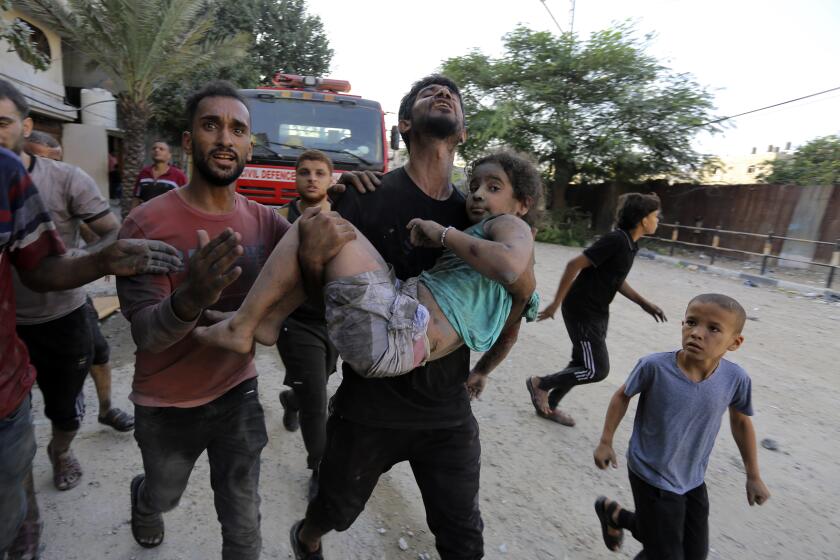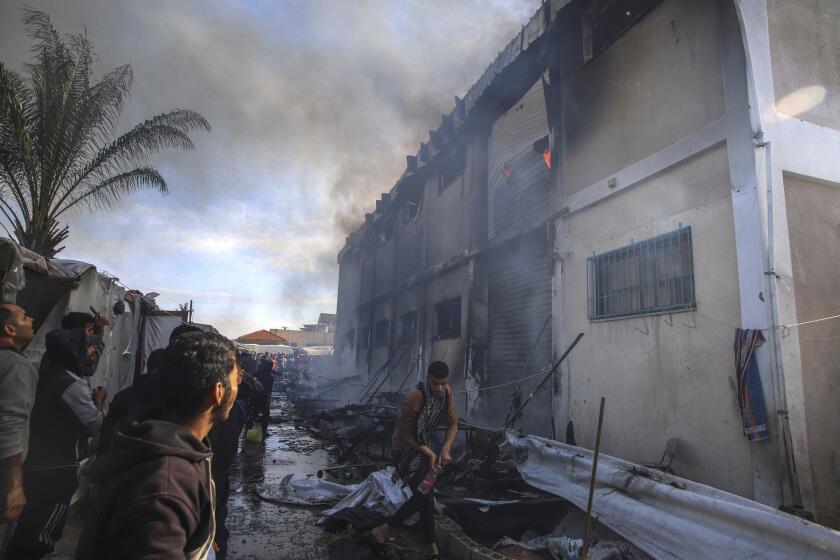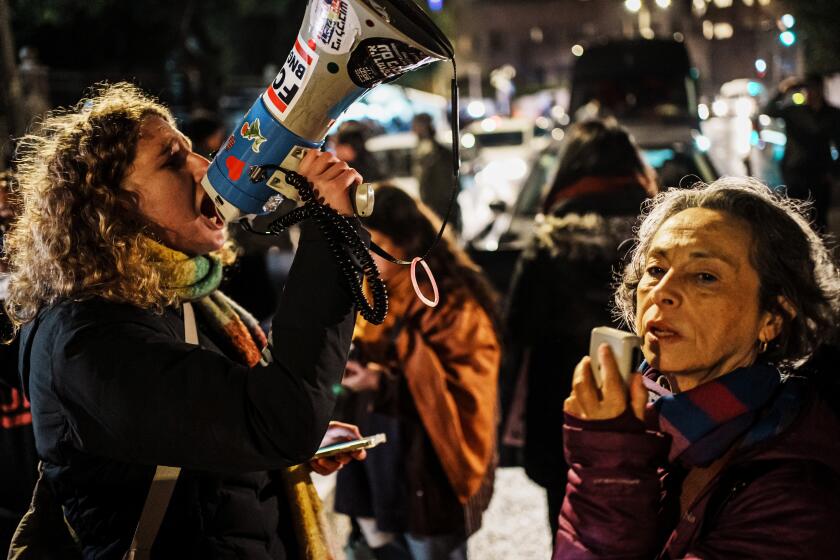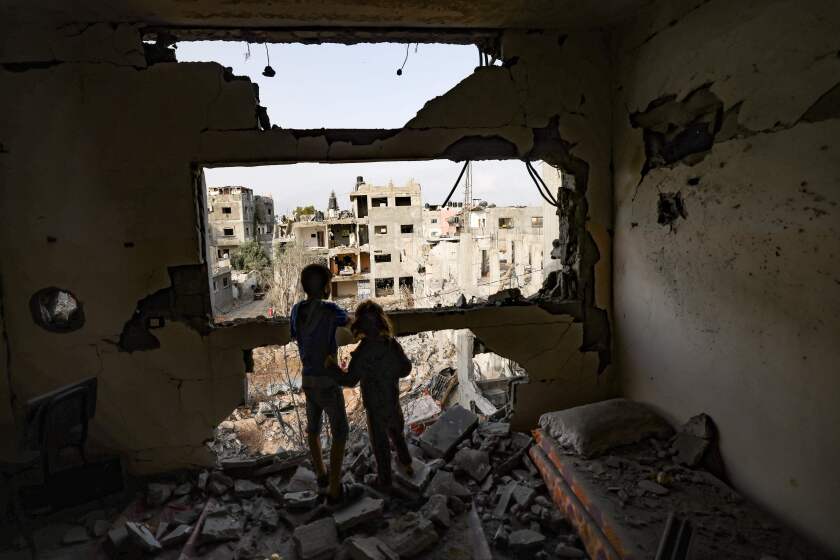Israeli strikes in Gaza kill 48 as fears mount over humanitarian crisis and West Bank violence
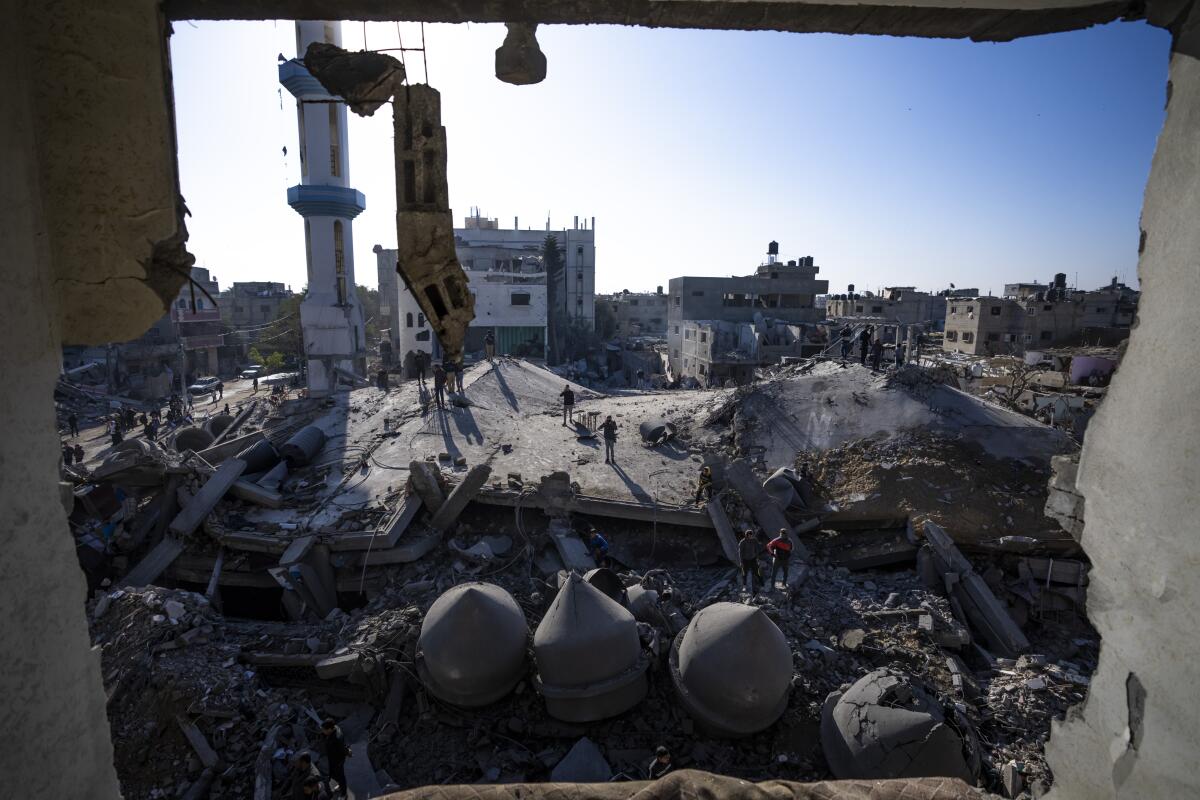
- Share via
RAFAH, Gaza Strip — Israeli strikes killed at least 48 people in southern and central Gaza overnight, half of them women and children, health officials said Thursday. European foreign ministers and U.N. agencies called for a cease-fire, with alarm rising over the worsening humanitarian crisis and potential starvation in the territory.
Tensions were also rising in the Israeli-occupied West Bank, where three Palestinian gunmen on Thursday opened fire on morning traffic at a highway checkpoint, killing one person and wounding five others, Israeli police said.
Israel’s defense minister, Yoav Gallant, announced Thursday that the government “will expand the authority given to our hostage negotiators.” His comments, delivered in a meeting with U.S. Mideast envoy Brett McGurk, signaled a small sign of progress in cease-fire talks.
Benny Gantz, who sits on Israel’s War Cabinet with Gallant and Prime Minister Benjamin Netanyahu, said late Wednesday that new attempts are underway to reach a cease-fire deal between Israel and Hamas that could pause the war in Gaza and bring the release of around 130 Israeli hostages held by the militants since their Oct. 7 attack on southern Israel. It was the first Israeli indication of new efforts since negotiations stalled a week ago.
Civilian deaths in Gaza have fueled global outrage. But many Israelis, still raw from Hamas’ Oct. 7 attack, have scant interest in the war’s toll on Palestinians.
But Gantz, a former military chief and defense minister, repeated his pledge that unless Hamas agrees to release the remaining hostages, Israel will launch a ground offensive into Gaza’s southernmost town, Rafah, during the Muslim holy month of Ramadan, which begins around March 10.
More than half of Gaza’s population of 2.3 million is crowded into Rafah after fleeing fighting and bombardment elsewhere in the territory. Israel has said it will evacuate them before attacking. But it is not clear where they would go, with much of the rest of the tiny Mediterranean enclave consumed in combat — raising fears civilian casualties could spiral in an Israeli assault that has already killed more than 29,400 people.
The heads of 13 U.N. agencies and five other aid groups issued a joint plea for a cease-fire late Wednesday, warning that an attack on Rafah will bring “mass casualties” and could “deal a death blow” to the humanitarian operation bringing aid to Palestinians, which “is already on its knees.” Earlier this week, the World Food Program had to halt food deliveries to northern Gaza because of increasing chaos.
“Diseases are rampant. Famine is looming,” they said, adding that aid workers are facing “shelling, death, movement restrictions and a breakdown of civil order.” They called for the opening of more entry points for aid to Gaza — including in the north — security assurances of safe passage for distribution and a release of hostages.
The International Court of Justice’s ruling comes at an early stage in South Africa’s case alleging that Israel’s actions in Gaza amount to genocide.
If outbreaks of infectious disease, already growing, become severe, they could ultimately cause more deaths than the offensive, a senior official with the World Health Organization said. “Infectious disease is a major concern for us in Gaza,” Richard Brennan, WHO’s regional emergency director, said at a briefing in Cairo.
The foreign ministers of 26 European countries on Thursday called for a pause in fighting leading to a longer cease-fire. They urged Israel not to take military action in Rafah “that would worsen an already catastrophic humanitarian situation.”
Thursday’s shooting came at a checkpoint on a West Bank highway where the gunmen opened fire on cars in the morning rush-hour traffic jam. An Israeli man in his 20s was killed and five others wounded, including a pregnant woman. Security forces killed two of the gunmen and detained the third, police said.
Hamas in a statement Thursday praised the attack in Jerusalem and said it was a “natural response” to Israel’s ongoing war in Gaza and raids in the West Bank, and called for more attacks until they can achieve a “fully sovereign” Palestinian state with Jerusalem as its capital. The militant group did not claim responsibility for the attack.
Tensions are rising in the West Bank ahead of Ramadan, which in the past has seen increased clashes, often in connection to restrictions imposed on Palestinian worshippers going to Al-Aqsa Mosque in Jerusalem’s Old City during the holy month.
More than three months into the Israel-Hamas war, the families of hostages held in Gaza have grown disillusioned with Israel’s military operations.
Israel’s hard-line national security minister, Itamar Ben-Gvir, has called for tight restrictions on Muslim prayers this year, including limits on Palestinian citizens of Israel. But no final decisions have been made.
Tempers are likely to be even more volatile this year over the Gaza war and spiraling violence in the West Bank.
Since the war began, the Israeli army has carried out near-nightly raids across the West Bank, arresting more than 3,200 Palestinians, including 1,350 it says are suspected Hamas members. Almost 400 Palestinians have been killed during the operations, according to the Palestinian Health Ministry. Israeli settlers have stepped up attacks on Palestinians, and there have been a number of militant shooting attacks against Israeli civilians.
A flurry of seven Israeli strikes hit Rafah early Thursday, one of them flattening a large mosque and devastating much of the surrounding block. Footage from the scene showed al-Farouq Mosque pancaked to the ground, with its concrete domes tumbled around it and nearby buildings shattered.
Another strike hit a residential home in Rafah sheltering the al-Shaer family, killing at least four people, including a mother and her child.
Strikes in central Gaza overnight killed 44 people, including 14 children and 8 women, according to hospital officials there.
Abdullah Alathamna’s family suffered when Israel shelled his family’s Gaza home in 2006. Now a father, he fears for his daughters. ‘I want to protect them,’ he says. ‘But I cannot.’
Israel’s bombardment and ground offensive in Gaza has killed more than 29,400 people and wounded more than 69,000, the territory’s Health Ministry said Thursday. The ministry does not distinguish between civilians and combatants in its count but has said around two-thirds of the dead are women and children.
Israel has vowed to destroy Hamas, which has ruled Gaza since 2007, after the Oct. 7 attack, in which militants from the territory stormed into southern Israeli communities, killing around 1,200 people, mostly civilians, and kidnapping around 250 people. Around 100 hostages were released in a swap for Palestinian prisoners during a weeklong cease-fire in November. Israel blames civilian deaths on Hamas, saying it operates among the population.
The United States, Israel’s top ally, has been working with mediators Egypt and Qatar to try to broker a deal for a cease-fire of several months with the release of hostages.
But talks stalled last week after Netanyahu rejected Hamas’ demands for any hostage release: a complete end to Israel’s offensive in Gaza and withdrawal of its troops, along with the release of hundreds of Palestinian prisoners, including top militants.
Lidman reported from Jerusalem. Associated Press writer Kareem Chehayeb in Beirut contributed to this report.
More to Read
Sign up for Essential California
The most important California stories and recommendations in your inbox every morning.
You may occasionally receive promotional content from the Los Angeles Times.
